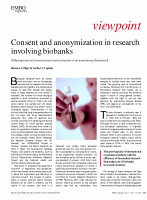Consentement et anonymisation dans la recherche impliquant les biobanques

|
Auteur(s)Dr Bernice Elger , Faculté de médecine , Université de Genève (Unige) . Prof. Arthur Caplan . |
Projet de recherche
Bases de données génétiques humaines: Vers un cadre éthique global
> voir le descriptif du projet
Mots-clés
biobanque - consentement - éthiqueRésumé
Ce résumé n'existe qu'en anglais
Biological samples — such as tissues,blood and cells — are an increasingly important tool for research into human diseases and their genetic and physiological causes. To ease their storage and access, many of these samples are now stored in biobanks. The number of human biological samples in such collections amounted to several hundred million in 1999 in the USA alone — about one sample per US citizen — and is increasing rapidly. Three-quarters of the clinical trials that drug companies submit to the US Food and Drug Administration (Rockville, MD, USA) for approval now include a provision for sampling and storing human tissue for future genetic analysis. At the same time, there is a boom of population biobanks, as more and more countries establish new sample collections. This boom of biobanks has spawned a ‘boomlet’ of regulations and guidelines, which has created controversies, particularly about the importance and definition of informed consent. The consent of participants is usually required before biobank samples can be used in research, but the nature of this consent, and how it is obtained, vary widely.
Fichier(s)
|
Consent and Anonymization in Research Involving Biobanks
Anglais | [120 ko] > télécharger |
